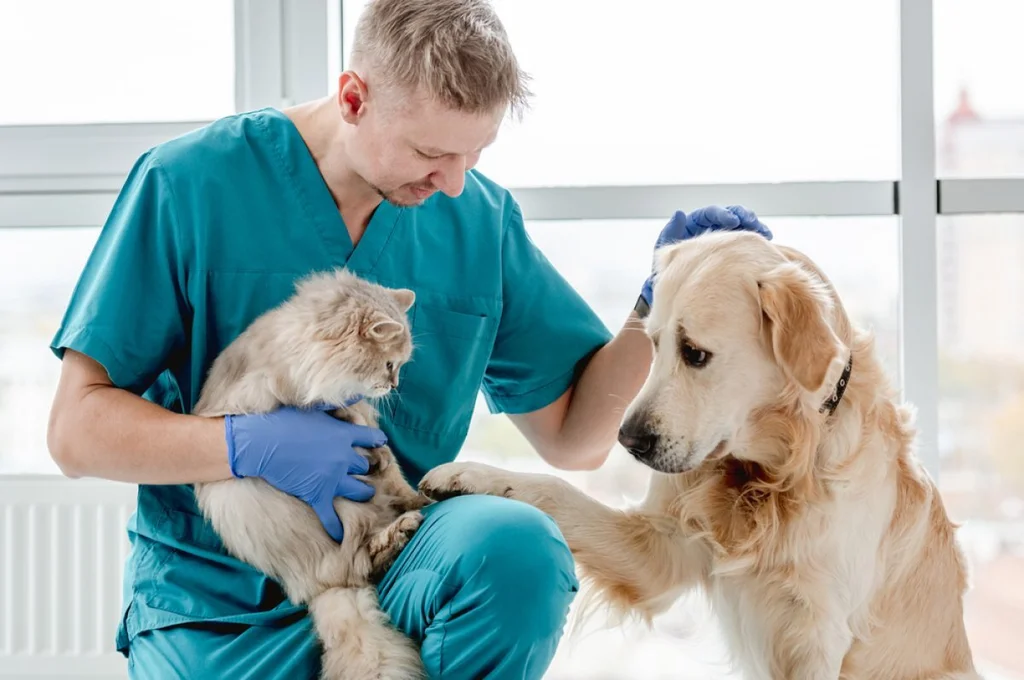As a responsible pet owner in the USA, ensuring your furry friend’s “how to keep your pet healthy” should be a top priority. Maintaining your pet’s wellbeing involves a multifaceted approach that encompasses preventive veterinary care, proper nutrition, regular exercise, and creating a safe, enriching environment.
By implementing these comprehensive strategies, you can “how to keep your pet healthy” and minimize the risk of health issues down the line.
Maintaining your pet’s overall health and wellness is a crucial responsibility for all pet owners in the USA. By adopting a proactive, well-rounded approach that addresses their physical, mental, and emotional needs, you can help your furry friend thrive and enjoy a long, happy life.
The strategies outlined in this comprehensive guide will empower you to keep your pet “how to keep your pet healthy” through preventive care, balanced nutrition, engaging exercise, and a safe, enriching home environment.
Importance of Preventive Veterinary Care
Regular check-ups and vaccinations are crucial for your pet’s overall health. Annual wellness exams allow your veterinarian to detect any underlying conditions early, provide necessary immunizations, and ensure your pet is up-to-date on parasite prevention.
Safeguarding your pet against heartworm, fleas, ticks, and other parasites is essential, as these can pose serious threats to their wellbeing.
According to the American Veterinary Medical Association, regular veterinary visits can help identify potential health problems before they become serious, often leading to more effective and less costly treatment.
During these check-ups, your veterinarian will perform a comprehensive physical examination, discuss any behavioral or dietary concerns, and recommend any necessary preventive care measures.
Maintaining your pet’s dental hygiene is another crucial aspect of preventive veterinary care. Poor oral health can lead to painful tooth and gum disease, which can, in turn, affect your pet’s overall wellbeing.
Professional dental cleanings, coupled with at-home brushing, can help prevent the buildup of plaque and tartar, reducing the risk of periodontal disease.
The Benefits of Staying Up-to-Date on Vaccinations:
- Protects your pet from highly contagious and potentially deadly diseases, such as parvovirus, distemper, and rabies.
- Helps maintain your pet’s overall health and reduces the likelihood of costly medical interventions down the line.
- Ensures your pet can safely interact with other animals and participate in activities like boarding, grooming, or doggy daycare.
- Fulfills legal requirements in many areas, as most states mandate certain core vaccinations for pets.
Providing a Balanced and Nutritious Diet
Choosing the right pet food that caters to your animal’s specific dietary needs is paramount. Whether you opt for a commercial brand or a homemade recipe, ensuring your pet’s diet is balanced and provides all the necessary nutrients, vitamins, and minerals is crucial.
Portion control and avoiding table scraps are also important, as obesity can lead to a host of health problems. Keeping your pet well-hydrated by providing access to clean, fresh water at all times is an often-overlooked but essential aspect of their overall wellbeing.
When selecting a pet food, it’s essential to consider your animal’s life stage, activity level, and any specific health concerns. Puppies, kittens, adult, and senior pets all have different nutritional requirements that must be met to support their growth, maintenance, and overall wellbeing.
Additionally, pets with conditions such as kidney disease, diabetes, or food allergies may require specialized diets.
Tips for Providing a Balanced Pet Diet:
- Read and understand the pet food label to ensure it meets the nutritional standards set by the Association of American Feed Control Officials (AAFCO).
- Opt for high-quality, premium pet food brands that use real, whole-food ingredients.
- Avoid feeding your pet excessive table scraps or human foods, as these can be high in fat, salt, and other ingredients that may be harmful.
- Transition to a new pet food gradually to prevent digestive upset.
- Consult with your veterinarian if you have any questions or concerns about your pet’s dietary needs.
Maintaining proper hydration is also essential for your pet’s health. Dehydration can lead to a host of problems, including kidney dysfunction, urinary tract infections, and heat-related illnesses. Ensure your pet has access to clean, fresh water at all times, and consider providing multiple water sources throughout your home.
Encouraging Regular Exercise and Playtime
Daily physical activity is vital for maintaining your pet’s health and preventing boredom or destructive behaviors. Depending on your pet’s species, breed, and age, you can incorporate a variety of indoor and outdoor exercises, such as walks, fetch, swimming, or interactive toys.
Engaging your pet in mentally stimulating activities, such as puzzle feeders or scent-based games, can also contribute to their overall wellbeing.
Regular exercise not only helps keep your pet physically fit but also plays a crucial role in their mental and emotional health. A sedentary lifestyle can lead to weight gain, muscle atrophy, and behavioral issues, such as excessive barking, chewing, or scratching.
By providing your pet with ample opportunities for physical and mental stimulation, you can help reduce stress, anxiety, and the risk of developing chronic health problems.
The Benefits of Regular Exercise and Playtime for Pets:
- Maintains a healthy weight and supports cardiovascular health.
- Strengthens muscles, joints, and bones, reducing the risk of injury or disability.
- Provides an outlet for natural behaviors, such as hunting, chasing, or digging, preventing the development of destructive habits.
- Enhances cognitive function and problem-solving skills through engaging activities.
- Strengthens the bond between you and your pet, as regular playtime fosters a deeper connection.
When it comes to exercise, it’s important to tailor the activities to your pet’s individual needs and capabilities. Puppies and kittens, for example, may require more frequent but shorter bursts of activity, while senior pets may benefit from gentler, low-impact exercises. Consult with your veterinarian to develop an appropriate exercise plan for your furry friend.
Creating a Safe and Enriching Environment
Ensuring your home is pet-proofed and free of potential hazards is crucial for your pet’s safety. Providing appropriate housing, bedding, and resting spaces that cater to your pet’s natural instincts and needs can also significantly impact their quality of life.
Incorporating sensory stimulation, such as scratching posts, window perches, or interactive toys, can help fulfill your pet’s innate desire for exploration and play.
A well-designed and safe environment can go a long way in supporting your pet’s overall wellbeing. By eliminating potential dangers, such as toxic household cleaners, exposed wires, or small objects that could be ingested, you can significantly reduce the risk of accidents or injuries.
Key Elements of a Pet-Friendly Home:
- Secure all chemicals, medications, and other potentially harmful substances in locked cabinets.
- Cover or block access to any areas where your pet could become trapped, such as under furniture or behind appliances.
- Provide appropriate sleeping spaces, such as soft, comfortable beds or crates, that allow your pet to rest and recharge.
- Incorporate vertical elements, like cat trees or window perches, to allow your pet to engage in natural behaviors like climbing and surveying their territory.
- Offer a variety of toys, puzzles, and interactive enrichment items to stimulate your pet’s senses and prevent boredom.
Creating an enriching environment goes beyond just ensuring your pet’s physical safety. Providing opportunities for mental stimulation, such as food-dispensing toys or scent-based games, can help fulfill your pet’s innate need to explore, hunt, and problem-solve. This, in turn, can contribute to their overall contentment and wellbeing.
Addressing Health Issues Promptly
Familiarizing yourself with the signs and symptoms of illness or injury in your pet is crucial. Whether it’s a sudden change in behavior, lethargy, or a visible injury, promptly contacting your veterinarian for an examination can make all the difference in their recovery and long-term wellbeing. Effective management of chronic conditions, such as diabetes or arthritis, can also greatly improve your pet’s quality of life.
Being able to recognize the early warning signs of health issues in your pet can help you take action quickly and prevent the condition from worsening. Some common signs to watch for include:
- Changes in appetite, water consumption, or bathroom habits
- Lethargy, reluctance to exercise, or unusual sleeping patterns
- Persistent vomiting, diarrhea, or constipation
- Unexplained lumps, bumps, or skin irritations
- Difficulty breathing, coughing, or sneezing
- Lameness, stiffness, or reluctance to move
If you notice any of these concerning signs in your pet, it’s essential to contact your veterinarian right away. Prompt diagnosis and treatment can often make a significant difference in your pet’s prognosis, especially for conditions that may worsen over time, such as kidney disease, heart disease, or cancer.
Regular check-ups and open communication with your veterinarian are also crucial for the effective management of chronic conditions. By working closely with your pet’s healthcare team, you can develop a comprehensive care plan that addresses your pet’s specific needs and helps maintain their quality of life.
Tips for Holistic Pet Care
In addition to traditional veterinary care, exploring complementary therapies, such as acupuncture or massage, can provide a holistic approach to your pet’s wellbeing.
Natural remedies and supplements (with your veterinarian’s approval) may also offer additional support, particularly for managing pain or anxiety. Incorporating stress-reducing techniques, like calming music or pheromone diffusers, can also contribute to your pet’s overall mental and emotional health.
Holistic pet care focuses on treating the whole animal, addressing both their physical and emotional needs. While traditional veterinary medicine often relies on pharmaceuticals and surgical interventions, complementary therapies can provide a gentler, more natural approach to healthcare.
Examples of Holistic Pet Care Techniques:
- Acupuncture: This ancient Chinese practice involves the insertion of thin needles into specific points on the body to stimulate the flow of energy and promote healing.
- Massage Therapy: Gentle, targeted massage can help alleviate muscle tension, improve circulation, and reduce pain and anxiety in pets.
- Herbal Remedies: Some herbs and natural supplements, such as glucosamine for joint health or chamomile for anxiety, may provide supportive care when used under the guidance of a veterinarian.
- Aromatherapy: Diffusing calming essential oils or using pheromone-based products can help soothe pets and create a more relaxed environment.
While holistic therapies can be a valuable complement to traditional veterinary care, it’s essential to work closely with your pet’s healthcare team to ensure any natural remedies or treatments are safe and appropriate for your animal’s specific needs.
Communicate openly with your veterinarian about your interest in exploring holistic options, and always obtain their approval before incorporating new therapies into your pet’s care plan.
Involving the Whole Family in Pet Care
Establishing a consistent caregiving routine and delegating responsibilities among family members can ensure your pet receives the attention and care they need, even when you’re away from home.
Teaching children how to interact with pets safely and establishing clear guidelines can foster a positive and nurturing relationship. Maintaining a consistent level of care, whether you’re at home or traveling, is crucial for your pet’s wellbeing.
Caring for a pet is a shared responsibility that requires the commitment and involvement of the entire household. By creating a structured routine and delegating tasks, you can ensure your pet’s needs are met consistently, even when individual family members are unavailable.
Tips for Involving the Whole Family in Pet Care:
- Assign specific caregiving duties, such as feeding, walking, cleaning, or playtime, to each family member.
- Establish a daily or weekly schedule to ensure your pet receives the attention and care they need.
- Teach children how to properly interact with pets, including how to approach, handle, and play with them safely.
- Set clear expectations and guidelines for pet-related responsibilities, and enforce them consistently.
- Maintain your pet’s care routine, including veterinary appointments and medication administration, even when traveling or during times of transition.
Encouraging the whole family to participate in pet care not only ensures your furry friend’s wellbeing but also fosters a stronger bond between your pet and the people they love. By working together, you can create a harmonious and nurturing environment that supports your pet’s physical, mental, and emotional health.
Conclusion
By implementing the comprehensive strategies outlined in this guide, pet owners in the USA can ensure their furry friends remain happy, healthy, and thriving. Maintaining your pet’s “how to keep your pet healthy” should be a top priority, as it not only contributes to their overall quality of life but can also prevent costly medical interventions down the line.
Remember, prevention is key. Prioritizing preventive veterinary care, providing a balanced and nutritious diet, encouraging regular exercise and playtime, and creating a safe, enriching environment are all essential elements of keeping your pet “how to keep your pet healthy”. Additionally, exploring holistic therapies and involving your whole family in the caregiving process can further enhance your pet’s wellbeing.
FAQs About How to Keep Your Pet Healthy
Q:What makes your pet happy and healthy?
A:Exercise your pet. Feed your pet a balanced, nutritious diet
Q:What prevents pets from getting sick?
A:Keeping your dog’s environment clean.
Q:How do pets improve quality of life?
A: Dogs specifically have been proven to reduce stress, anxiety and depression, ease loneliness, encourage exercise, and improve your overall health.
Q:Can pets reduce depression?
A: The release of these happy hormones may reduce feelings of depression and sadness.
Q:Why do dogs love humans?
A:Dogs find great comfort and joy in the consistency and routine shared with their human companions.

Hi. My Name is Alexander Bell. I am a professional content writer since 2006.
18+ years of experience crafting compelling and authoritative content for diverse audiences.
🖋️ Specialize in formal article writing, combining meticulous research with engaging storytelling.
📚 Proven track record of delivering high-quality content across various industries, including technology, finance, and healthcare.
💡 Skilled in SEO best practices and optimizing content for digital platforms to maximize reach and engagement.
🔍 Strong research capabilities, adept at distilling complex information into accessible, informative articles.
🎓 BA in English Literature









